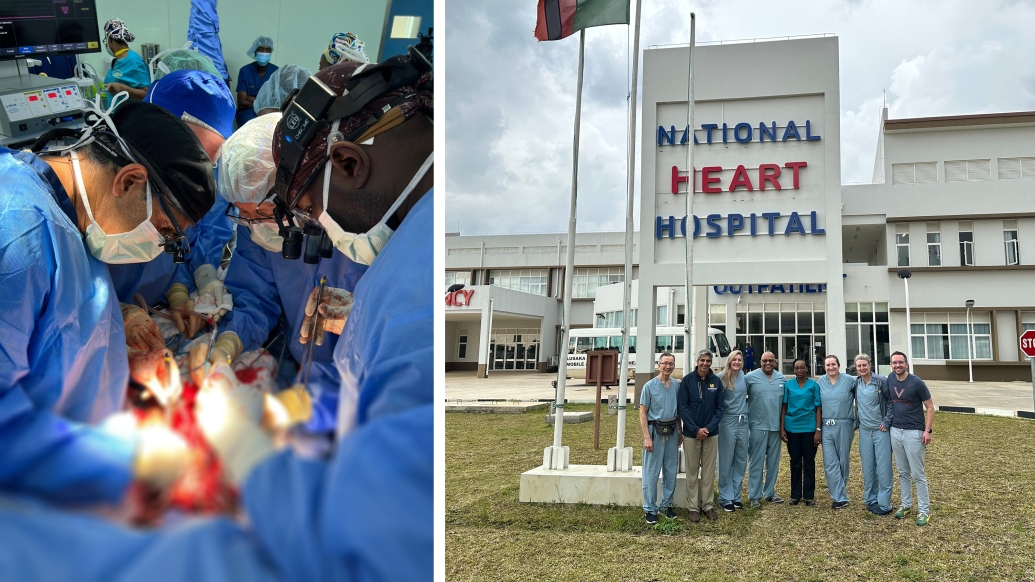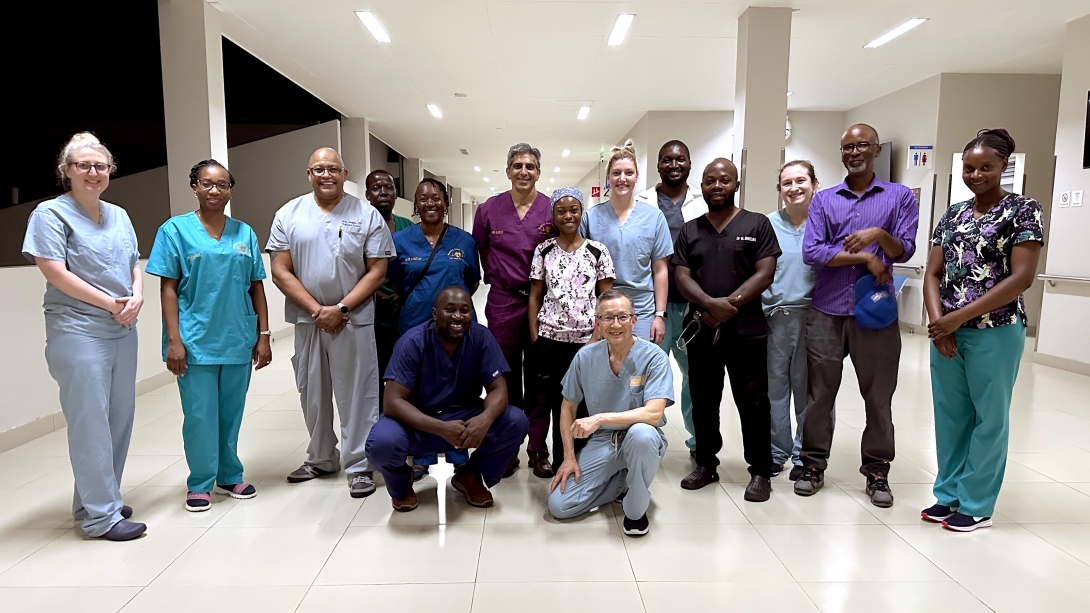The country’s first National Heart Hospital began performing cardiac surgeries in September 2021
10:21 AM
Author |

Surgeons in Zambia completed the country’s first total aortic arch replacement – guided by a team from University of Michigan Health.
The six-person surgical team traveled from Ann Arbor to Africa in late February to co-lead this case and several others at National Heart Hospital, a government-established, 120-bed facility in Lusaka, Zambia.
The historic procedure to replace the ascending aorta and aortic arch of a 72-year-old patient took place on March 2. The patient’s echocardiogram revealed a potentially fatal aortic dissection that reached eight centimeters in diameter and extended into both his carotid arteries. The surgery, which lasted six hours, was uneventful with no complications.
“It was a tremendous privilege to work with the providers at National Heart Hospital, as well as our experienced team from U-M, to perform this historic case in Zambia,” said Gorav Ailawadi, M.D., director of the U-M Health Frankel Cardiovascular Center and Helen F. and Marvin M. Kirsh Professor and chair of cardiac surgery at U-M Medical School.
Zambia, a country of around 20 million people, has fewer than 10 cardiac specialists in both the government and private sector. Cardiovascular disease is the nation’s second leading cause of death.
The National Heart Hospital began conducting cardiac surgeries in September 2021. The U-M Health team worked the recent cases with Chileshe Mutema, M.D., chief of cardiothoracic surgery at National Heart Hospital.

In the past, Mutema says, expatriate cardiac surgeons were hired periodically to fly in for procedures, yet less than 1% of patients who needed cardiac surgery saw benefits.
“Performing this case with U-M showed us what is possible and that the capacity to do complex cases comes with a knowledgeable, experienced and well-organized team with each team member doing their best,” Mutema said. “This was significant because we aspire for such a time when we can have such surgeries on our own, as long as we grow step by step consistently. It was a historical moment to perform surgeries and learn from Dr. Ailawadi and his team. And I believe, with the help of U-M, we can attain that level sooner.”
The surgical team faced several challenges while operating in Zambia. Beyond the fact that no provider had repaired an aortic arch, supplies were limited in all cases.
When performing operations in Ann Arbor, surgical teams employ a method called hypothermic circulatory arrest, or HCA; this temporarily cools the body and suspends blood flow while preserving brain function and preventing stroke.
For the aortic arch replacement at National Heart Hospital, surgeons had no access to a multi-branch graft that allows them to employ circulatory arrest only once during a procedure. Instead, they had to tailor a straight tube graft that forced surgeons to subject the patient to two episodes of hypothermic arrest. The team also devised a way to maintain some blood flow in the brain through a blood vessel.
We hope to continue to help patients across the world by teaching local teams to perform these life-saving operations with the highest level of safety."
- Gorav Ailawadi, M.D.
In another case, a double valve replacement in a 49-year-old agriculture supervisor who could no longer work due to his symptoms, they ran out of tubing kits used to deliver medications and nutrients that keep the heart from beating during surgery.
This time, the surgical team applied fibrillatory arrest, a challenging method to open the heart while it is still beating, to perform a mitral valve replacement. They also repaired the patient’s tricuspid valve – for which they needed to fashion a tricuspid ring out of a piece of felt.
“While we were there, each member of our team played an important role and we all worked together seamlessly to ensure that the surgeries were performed safely and efficiently,” said Thuy Le, PA-C, advance practice provider manager of the U-M Health Frankel CVC Cardiac Surgery Operating Room. “With the understanding of anatomy and surgical techniques, our team was able to think critically and collaborate with our colleagues to find creative solutions when unexpected issues arose.”
The success of the cases is very encouraging for the NHH, Mutema says, especially being a young program.
“It’s humbling to see patients going back to normal life when not long ago it was a death sentence,” he said. “The patients are very grateful for adding more years to their lives and accessing costly life changing surgery from home in Zambia. We hope to have regular perioperative clinical meetings, collaborative capacity building and more camps so that U-M can help us develop a quality, sustainable cardiac surgery program in Zambia and the region.”
This was an uplifting experience for the U-M team to share knowledge and techniques that can help the local team save the lives of Zambian patients for years to come, Ailawadi adds.
“We hope to continue to help patients across the world by teaching local teams to perform these life-saving operations with the highest level of safety.”
The U-M Health team in Zambia included Thuy Le, PA-C, Chris Douglas, C.C.P., Lauren Richey, M.D., Hillary Poulos, R.N., Sydney O’Shaughnessy, C.C.P.

Explore a variety of health care news & stories by visiting the Health Lab home page for more articles.

Department of Communication at Michigan Medicine
Want top health & research news weekly? Sign up for Health Lab’s newsletters today!





